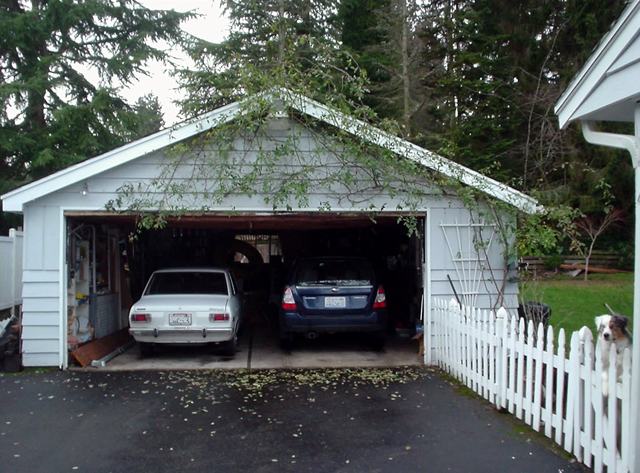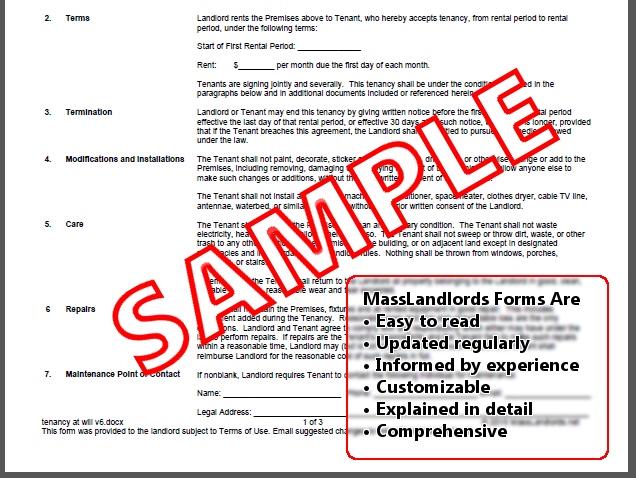Parking Agreement (Fixed Term)
The MassLandlords parking agreement for Massachusetts, first released October 2025, allows the owner of a parking space to rent it without having to include it in an apartment or home rental. This makes the parking agreement our first non-residential rental form. This is not a purely commercial rental agreement, though: a parking renter may be a business or a natural person. If a person, then consumer protection law would still apply. This agreement can stand alone and apart from any residential tenancy. Or it can be attached to a residential tenancy.

You can rent parking spaces separately from housing. You can number spaces to match the street address, as well. (No need to go in sequence!)
If you attach this form to a residential tenancy and blindly follow vehicle storage law, your actions could subject you to triple damages or criminal prosecution. The vehicle storage law permits things that landlord-tenant law does not. The form allows you to use storage law only if the form is used standalone apart from a residential tenancy. If the form is used as part of a residential tenancy, then some of the things it says you can do cannot be done. You cannot take a parking deposit. You cannot lock out a non-payor. It is up to you to read and follow the nonsubordination clause and the law. When in doubt, consult with an attorney.
Why We Created a Parking Agreement
Parking can be rented separately from housing. Anecdotally, it feels like the markets for housing and parking are starting to decouple a little.
Parking minimums have been removed from at least one zoning ordinance (Cambridge) because removal will allow them to build more housing. This means new housing can come with no parking. Residents of such parkingless buildings who need parking will be on the market for a standalone space.
Similarly, older buildings often come with excess parking, especially in urban settings where residents may prefer e-bikes, rideshare or transit.
Work-from-home has reduced commuting time and therefore household demand for vehicles.
Households feeling the squeeze of inflation are rightly downsizing to just one shared vehicle or no vehicles at all. (The savings from eliminating one SUV from the household, in terms of reduced depreciation, interest, insurance and maintenance, easily run above a thousand dollars per month.)
For all of these reasons, some renters would rather pay less rent for an apartment without parking, leaving us free to rent out that space to someone else.
Rates for spaces in urban settings can be hundreds of dollars a month and may vary according to market factors that are separate from residential markets.
Members were asking for parking agreements and it made sense for us to have one drafted.

You can rent garage space separately from housing. If renting garage space, and you intend for a renter to store anything other than a vehicle, also use our storage agreement.
Is this a Standalone Agreement for Parking/Tandem Parking?
Yes, this agreement is not an addendum to any tenancy. It includes all terms that members directed us to incorporate. It has separate signature lines.
Does the Parking Agreement work for Garage Parking?
Yes, if you want the renter to park one or more vehicles and no other objects, then this parking agreement is all you need.
If you want to give the renter the ability to store non-vehicle objects (boxes, tools, whatever), this Parking Agreement should be signed alongside our Storage Agreement.
Garage parking is more difficult than exterior parking because a garage is basically an interior storage area. Whether we want it used for storage or not, renters may store boxes or other items besides vehicles in garage spaces.
The parking agreement and the storage agreement carve out separate, non-overlapping rented spaces. They can be signed alongside one another.
What if I want to allow unregistered vehicles to park?
Some of us have a line of business allowing renters to park vehicles with value for reasons other than their drivability. They may be antiques, held for scrap, removed from registration for failure to obtain an inspection sticker, or unregistrable in any number of other ways.
The advice from one attorney we spoke with was clear: “don’t do it.” First of all, registration requires insurance, so it’s another check that your renter is insured. Second, it is difficult to identify who to sue if you have a problem with an unregistered vehicle. This difficulty is compounded if you have a written agreement giving someone permission to bring such an unregistered vehicle onto the property. An unregistered vehicle may be in such a state that it is decaying, damaging the driveway, leaking oil, gasoline or other fluids into nearby topsoil, harboring animals or vermin, used as an impermissible storage device or worse. You might have to bring suit against the renter and the title owner. If the title is defective or unclear (a possible reason why the vehicle was not registered), it could be a long time before you can even find out who is responsible, let alone before your matter is resolved. The message is clear: require vehicles be registered.
If you want to rent to unregistered vehicles, you can download and modify this form at your own increased risk. Consult with an attorney to find one willing to defend your business practices.
How do I screen an applicant for a parking space?
Use a process similar to a residential screening. Take a government issued photo ID. Verify the ID is real, valid and matches the applicant. For each vehicle to be parked, take a copy of the title, registration and insurance. Verify ability to pay (e.g., check pay stubs or bank statements). If any document is not provided, do not rent to the applicant. Use other factors according to your experience, including credit score and a criminal background check as suits your purpose. You can require the applicant to sign a Driving Record Request Form and reject any applicant with a history of hitting stationary objects, or worse. Develop a written screening process and apply it fairly to all applicants.
What if a renter breaches this agreement?
It will depend on whether you have signed this agreement parallel to any residential tenancy.
If this agreement looks related to a residential tenancy, whether or not at the same property, then there is a commercial summary process (eviction) procedure available to regain possession of the Space(s) separately from the tenancy.
If this agreement is in no way connected to a residential tenancy, then you may be able to avail yourself of the storage law, General Law Chapter 105A. This provides for draconian punishments for renters who fall behind, up and including selling the vehicle. This may hinge on whether the space is a come-and-go commuter spot or a long-term storage spot.
Consult with an attorney.
Why didn’t we put in a late fee?
If your parking renter is late, terminate the agreement for nonpayment and get your space back. Late fees can be challenged in court on the basis of usury or consumer protection and create little incentive for the renter to pay your rent on time. If you want, you add your own clause to add a late fee. We are not aware of any restrictions on timing or amount for standalone agreements; a good rule of thumb would be to stay within three times the minimum hourly wage (at time of writing, $45). If this agreement is used in connection with a residential tenancy, do not apply a late fee.
Tandem Parking
Many condos are sold or rented with tandem parking, where one car blocks another. To the best of our knowledge, our parking agreement is the first agreement to offer guidance on how tandem parking should work.
When used for tandem parking, our agreement has both the blocker and the blocked driver fully notified and signed onto each other’s agreements. This is far better than current informal practice where a parker might not even know the full legal name of the person with whom they are expected to share keys. Full contact details are shared.
Tandem parking creates insurance exposure, as some tandem spaces require a vehicle to be driven by a non-insured, non-household member to make room for the blocked vehicle. Our form puts renters on notice to obtain coverage that includes this so-called “permissive use.” Our agreement specifies that the “permissive use” must be no greater than is required to clear the space.
Additionally, we consider what happens when one tandem parker changes the seat position, mirror settings or other settings of another.
The text of the agreement could be sufficient to advise against most tandem parking. But it’s here for those who want to try it.
Can I use this with a residential tenancy?
Yes, this agreement has received more attention than our in-lease parking clauses. You can include this agreement as park of a lease packet. In that case, you may wish to rename this an addendum, or you can leave the title as-is. A clause in the agreement makes this parking agreement subservient to a residential tenancy agreement.
What if I want to offer Month-to-month parking?
Sign the fixed-term parking agreement and replace clause 10 with the following. “10. Renewal: After the initial term, this Agreement renews monthly until either party cancels with one full rental period notice. Notice shall be given in writing, text message or email.” You can then sign the parking agreement with an initial term of one month.
- v1.3 October 2025
- Initial version.
To view this form, you must be logged-in and a member in good standing

MassLandlords is a nonprofit dedicated to helping owners rent their property. We try our best, but we can't guarantee these forms will always work. We provide legal information but never advice particular to your situation. Nothing on this site is meant to create an attorney-client relationship. We advise you consult with an attorney.





